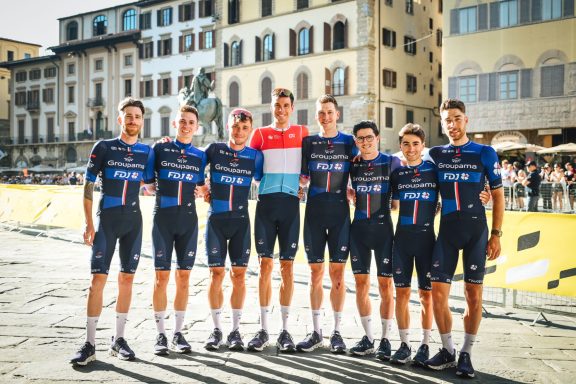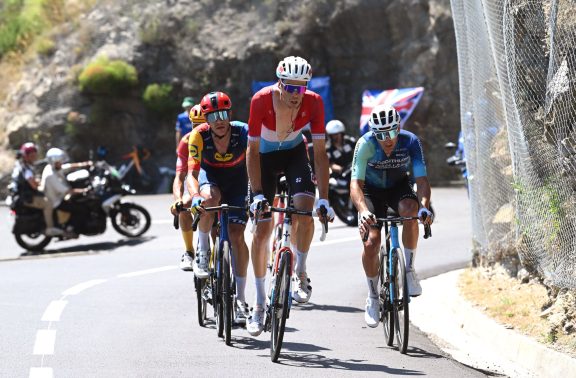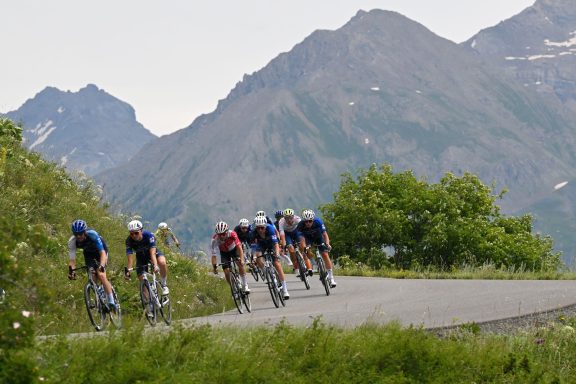The motivation was certainly high. Unfortunately, it didn’t prove enough this Sunday on the gravel roads featuring on stage 9 of the Tour de France. Around Troyes, in what was an extremely intense day, the Groupama-FDJ’s riders fiercely tried to join in the battle for stage victory. However, after Romain Grégoire’s proved unsuccessful, the breakaway went clear without them. Stefan Küng and Clément Russo took part in a chasing group which was never able to bridge across, and David Gaudu showed himself in the final, but he couldn’t get back in the mix for the win either. The Breton took fifteenth place, Anthony Turgis won.
It was time, this Sunday, for the most unique stage of the 111th Tour de France. Around Troyes, across nearly 200 kilometres, the riders were facing the “white roads” for a day which was considered by some like a “gravel” race. Fourteen sectors, some of which uphill, were on the day’s menu, which made for a total of 32 kilometres. It was also a dream opportunity for the breakaway riders, and the expected battle at the start did take place. After about ten kilometres, a first group managed to get away, and Romain Grégoire was in there. A hard fight then followed over nearly thirty kilometres with the peloton, the gap never went over twenty seconds, and everything then came back together a few kilometres before the first “white road”. Quentin Pacher and David Gaudu followed some of the counterattacks, but the French puncher missed the right move of ten riders for just a handful of seconds. The bunch then calmed things down and kind of blocked the road in the first sector. When they were finally able to find their way through, after the day’s first climb, Clément Russo and Stefan Küng had a one-minute gap to make up.
“It’s a bit frustrating”, Clément Russo
With a handful of other riders, they tried to lead the chase for almost an hour of racing, but the peloton ultimately closed on them faster than they closed on the breakaway. Their attempt therefore ended 110 kilometres from the finish. “Romain made a big effort at the start, then we missed the right move, and we were always one step behind,” said Benoît. “It’s really a pity.” “The goal was really to fight for the stage, to be active and to go up front,” confirmed Clément Russo. “Unfortunately, we broke away a bit too late with Stefan and we did not manage to catch up with the leading riders. Then, in the back, there was also a strong fight in the yellow jersey group… It’s a bit frustrating.” After a few minutes of rest in the bunch, the action restarted around halfway, and the GC contenders attacked one another. “It was fighting all day,” explained Quentin, who followed the yellow jersey group for a long time. “There was a real fight for position before each sector, and it was full gas until the end. In the middle of the race, there were some really steep sectors, which made for a real selection.”
“I had a lot of fun”, David Gaudu
In a peloton of around forty riders, Kevin Geniets, David Gaudu and Quentin Pacher were still present starting the last hour of racing, while Stefan Küng was distanced due to a puncture. When the profile got flatter in the last forty kilometres, a few counterattacks started from the peloton, a minute and a half behind the breakaway, and David Gaudu stood out. “My day got off to a bad start after the second sector, but I didn’t panic,” he said. “It all came back, I was able to get back into the race, and the more sectors passed, the better I felt. In the final, I saw Matthews and Tiller attack, and I followed. I turned around, I saw Van der Poel, the green Girmay jersey, and Quentin told me on the radio that the gap was made. I wondered what I had gotten myself into with such guys!” Within a group of strong men, the Breton came back around thirty seconds behind the leading men, but despite the remaining white roads and strong turns, the gap couldn’t be closed. “We weren’t that far from coming back, but two riders didn’t pull because they had someone in front and we didn’t succeed,” he said. “In any case, I had a lot of fun on these white roads. It’s my best day since the start of the Tour.”
The French climber eventually took 15th place in this intense and sometimes crazy stage, one minute after the winner Anthony Turgis. “The legs are coming back nicely,” he added. “We’ll have to recover tomorrow, the day after tomorrow as well, and we will try to attack again on Wednesday towards Le Lioran.” “It’s a missed opportunity, but we’ll try again,” confirmed Clément. Benoît Vaugrenard concluded: “We are obviously very disappointed because I think we deserved better. The team was strong, but we didn’t race as well as we should, and we paid for it.”



No comment